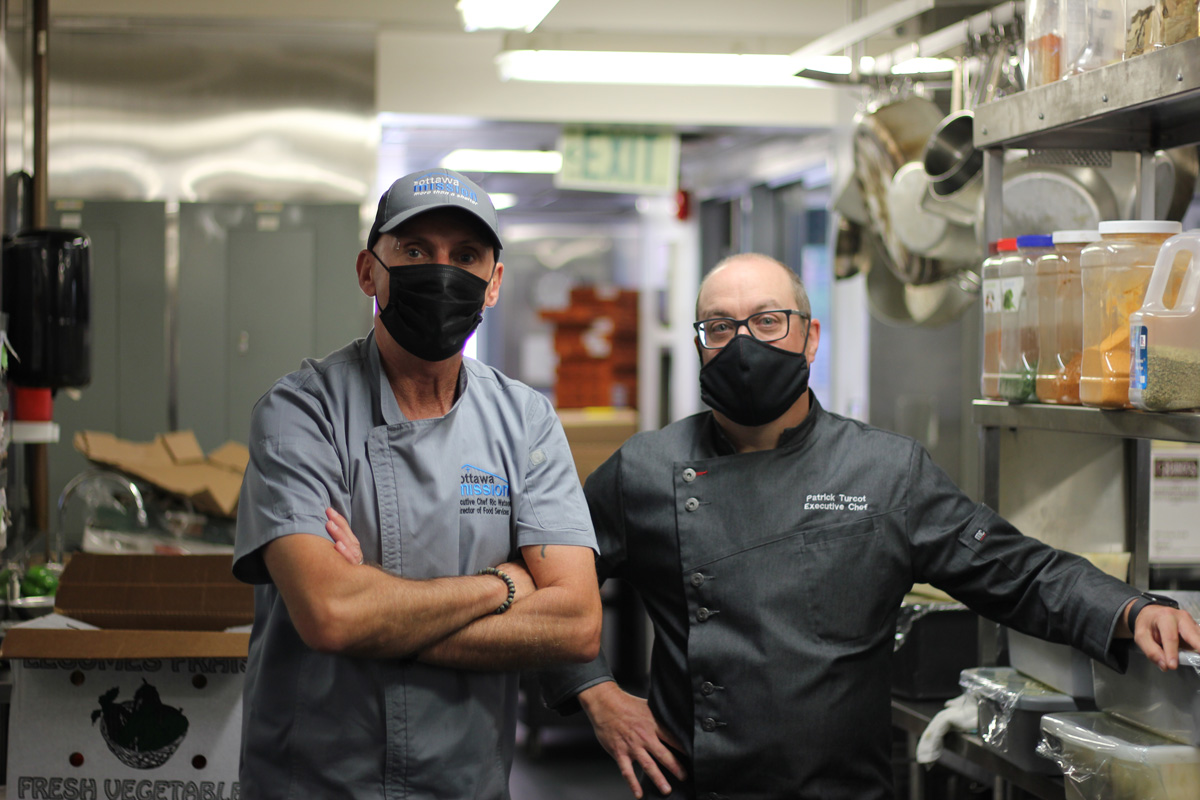Shelter also releases community impact report, including providing 728,000 meals in response to hunger
Ottawa, ON – Today, The Ottawa Mission and Ottawa Inner City Health (OICH) marked the 20th anniversary of the founding of the Diane Morrison Hospice to provide palliative care to homeless community members.
Wendy Muckle, CEO of Ottawa Inner City Health, noted the reason the Hospice was founded. “People who are homeless or street-involved have a much higher burden of serious physical and mental health conditions and addictions. As a result, our clients can die up to 20 years’ earlier than people who have permanent homes. Think of that: because you have no home, your risk of premature death increases dramatically.”
A fundamental principle of the Hospice is that no one dies alone. The provision of care is based on ensuring the dignity of all people reflective of their inherent value as human beings. The Hospice extends unconditional acceptance to people who are homeless by providing palliative care appropriate to their needs.
A federal grant enabled OICH and The Mission to establish the Hospice. By bringing care directly to those who are homelessness, the project sought to show that this model of care is more accessible, appropriate, and improves clinical outcomes. “Over the past 20 years, the Hospice has demonstrated this,” Muckle added.
Dr. Jeffrey Turnbull, OICH Medical Director, noted the evolution of the burden of illness of Hospice patients and the care provided to them. “While 20 years ago AIDS was a major cause of mortality for people who were homeless, with advances in treatment, premature death for this population has dramatically declined. Now, the causes of death are related to the impact of addictions and mental illnesses such as bipolar disorder, post-traumatic stress disorder, and other afflictions. This population suffers from very high rates of alcohol consumption, smoking and other addictions, which leads to cancer, Hepatitis C, and organ failure.”
While many people within the Hospice die within months, some do not. They have chronic palliative conditions, which have a life expectancy of one year, compared to those patients with terminal conditions which end in premature death within three months or less. With their admission to the Hospice, they receive care, proper nutrition, and other supports, so their health improves and they can return to where they were living before or in new accommodation. “The Hospice has proven that people with lived experience of homelessness who are ill can get better with the proper care and supportive services,” Dr. Turnbull added.
In addition to providing appropriate and accessible care, the Hospice is also cost-effective. Five years after it opened, a review of the Hospice’s cost-effectiveness was undertaken. This analysis determined that compared to the acute care system where the cost per patient would have been $900 per day, care within the Hospice cost $70 per day. Over the course of one year, cost savings for care were projected for a group of 28 patients at $1.39 million. The Mission and OICH are exploring options to update this analysis based on this evolving context to reflect the current work of the Hospice, combining both acute and chronic palliative care.
Lynn Landis, Director of Health Services for The Mission, noted the circle of care that the Hospice provides. “We provide a person-centred atmosphere that celebrates the life of our patients. They have personal effects in their rooms, and special celebrations include birthdays and holiday parties. Personal support and peer support workers help patients through assistance with activities of daily living such as feeding and bathing, as well as listening to patients. Many patients have painful conditions such as cancer, and pain and symptom management is essential to ensure their comfort. Managing addiction is also critical. Managed Alcohol and Managed Opioid Programs employ a harm reduction approach through providing patients small amounts of each substance throughout the day. Their physical and psychological symptoms are controlled, and their quality of life is improved.”
Landis also spoke of the importance of spiritual care, including grief support. “Spiritual pain and loneliness are some of the most profound afflictions of people who are homeless. Many are estranged from their families and have few or no friends. Our circle of care surrounds them, including spiritual support. Our spiritual care team listen to their stories and provide comfort, alleviating their fears. When a patient dies a memorial service is held to allow a patient’s family, friends, Hospice volunteers and colleagues to provide solace to one another,” she added.
Learn more about The Ottawa Mission’s Hospice at 20
The Mission also released its annual impact report which outlines its community impact over its past fiscal year. Among the most significant responses by the shelter to community need during the pandemic has been a huge increase in the number of meals over last year through its modified community meal service as well as its food truck service. Beginning with five stops delivering 500 meals per week, this food truck service now has 19 locations rotating throughout Ottawa 7 days a week that deliver over 3,000 meals per week. Since it started, the food truck has delivered more than 150,000 meals to people across Ottawa. The Mission also has a waiting list of partners who want to join this program. “This has meant that over our last fiscal year, we served almost 728,000 meals. Every time I think of this figure, I’m blown away by the level of need and the number of people this represents,” noted Mission Director of Food Services Chef Ric Allen-Watson.
“If current trends continue, this year we’ll deliver between 900,000 and 1 million meals. Every single day our truck goes out across Ottawa, and hundreds of people line up to receive the meals they need to survive. People line up in walkers, in wheelchairs, and with their kids. People who never had to worry about feeding themselves and their families until Covid-19 arrived come to our truck to survive. Food truck clients tell us that they go hungry, sometimes for days, until our truck comes. In a wealthy city like Ottawa, this is wrong – just plain wrong,” Allen-Watson added.
Despite the ongoing impact of Covid-19, Peter Tilley noted the additional accomplishments of The Mission over the past year, including:
- Providing emergency shelter to 1244 people.
- Finding permanent homes for 144 people.
- Hosting 15,362 primary care patient consults in its health clinic working with OICH.
- Having 85 graduations from its Addiction and Trauma Services program, and 39 graduations from its education and job training programs.
- And work to open “Chef Ric’s”, the Mission’s new social enterprise which expands our successful Food Services Training Program and provides healthy food to people at very affordable prices.
“Ottawa was already experiencing a homelessness emergency and opioid-use epidemic before COVID-19. Given the impact of the pandemic on our collective mental health, finances, food insecurity and risk of homelessness, we anticipate remaining the first place of refuge for even more vulnerable people after the pandemic has passed,” Tilley concluded.
Learn more about The Ottawa Mission’s impact
About The Ottawa Mission
Since 1906, The Ottawa Mission has been serving those who are homeless, hungry and lost by providing food, clothing, shelter and skills. In 2020-2021, The Ottawa Mission provided emergency shelter to an average of 185 men every night and served an average of 1,994 meals every day. The Ottawa Mission also provides to men and women health services, mental health and addiction treatment programs, hospice care, dental services, housing services, educational support, job training, spiritual care, and clothing to thousands in need in our community. In September 2020, The Ottawa Mission marked the one millionth hour that the shelter has been in existence since its founding in 1906. In 2019, the Mission became a housing-focused shelter reflective of its commitment to a home for everyone as a human right with the launch of its housing department. Visit ottawamission.com to learn more.
FOR INFORMATION, PLEASE CONTACT
Aileen Leo
Director of Communications
T 613.234.1144 x 305
C. 613-712-3092
E-mail: aleo@ottawamission.com



